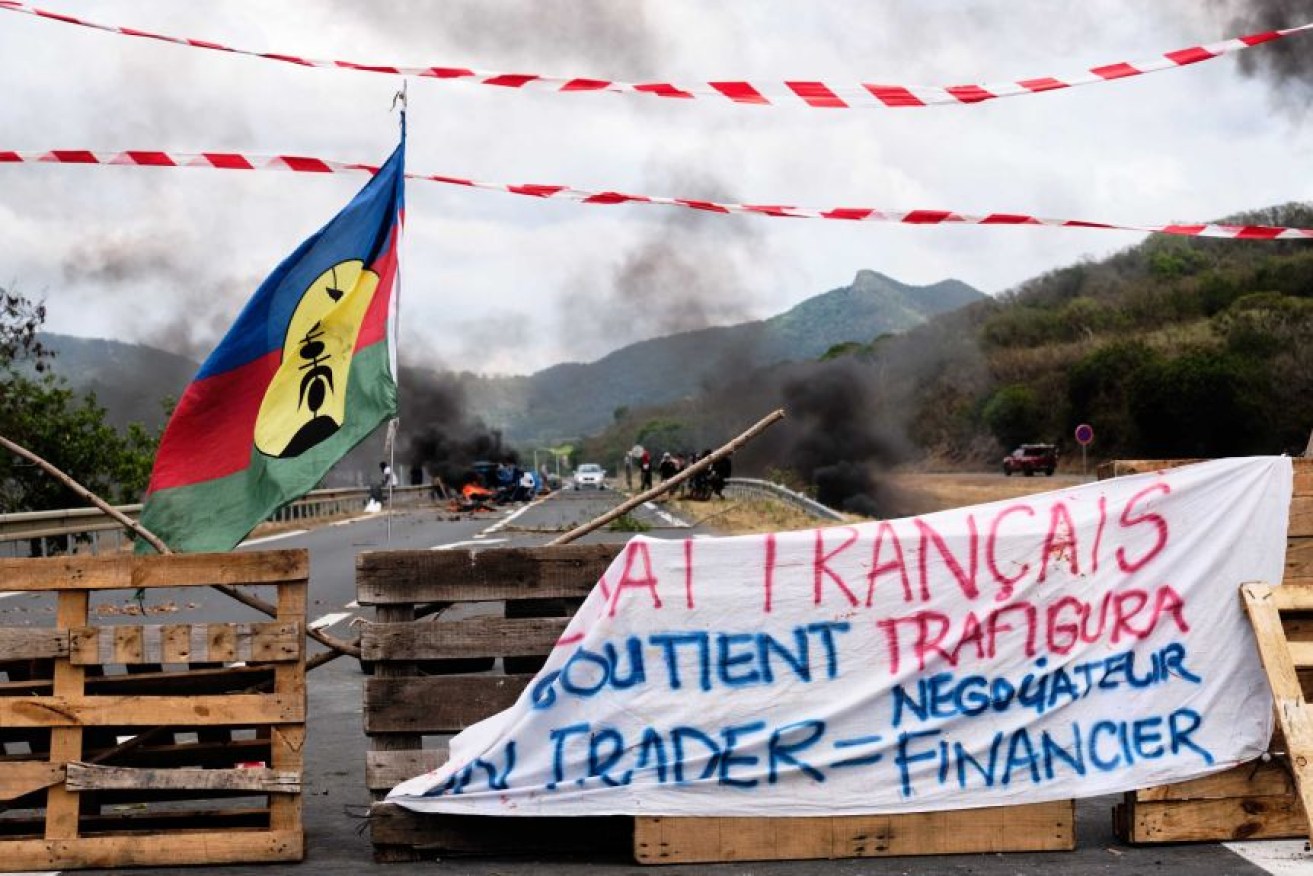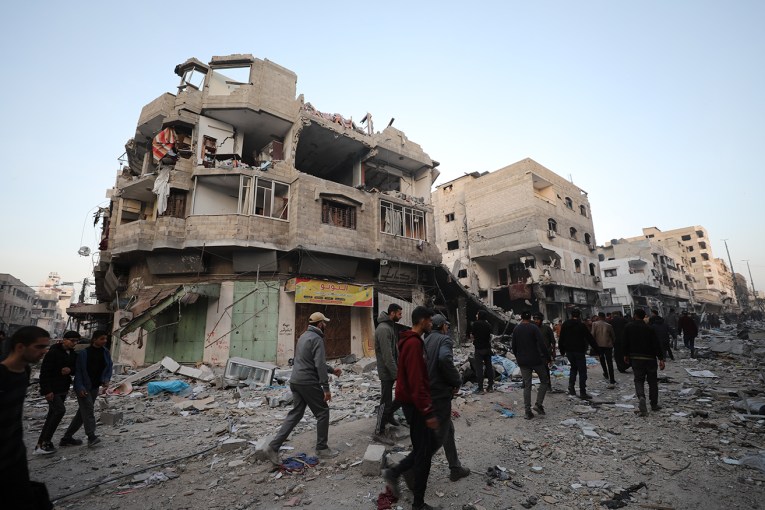How a mining dispute in New Caledonia inflamed tensions between pro-French loyalists and Indigenous Kanaks

Independent Kanak flags were placed on a roadblock outside of Noumea. Photo: ABC/AFP/Theo Rouby/Hans Lucas
Violence has shaken the usually serene archipelago of New Caledonia after the sale of a massive nickel mine to the French Pacific territory’s south.
Cars have been set alight, a mining site evacuated as protesters turned up with weapons, and armed activists waving French flags have put in place roadblocks in some districts.
In capital Noumea, black smoke shrouded palm trees near the harbour last week as protesters set fires around the city.
Police threw canisters of tear gas and arrested dozens in response.
For many residents, the scenes recall the territory’s tense civil conflict of the 1980s, and bring attention to simmering ethnic tensions that threaten stability on the islands.
So how – just two months after the territory held a largely peaceful referendum on independence from France – did the situation in New Caledonia deteriorate?
Bitter mining dispute pits Indigenous landowners against foreign companies

Indigenous protesters have attacked the mining site in Goro to New Caledonia’s south. Photo: ABC
The hostilities began after the Brazilian mining company Vale announced plans to sell its massive nickel and cobalt plant to the south of New Caledonia.
An Australian company, New Century Resources, initially eyed the operation, entering exclusive discussions for takeover from Vale.
But Indigenous Kanak landowners, under the name ICAN (Instance Coutumière Autochtone de Négociation) – along with pro-independence leaders – balked at the idea of giving up the mine to foreign owners.
They wanted local company Sofinor, backed by Korea Zinc, to take over the reins.
Protests ensued, and New Century Resources quietly retracted its bid in September, a month before Caledonians went to the polls for a referendum on independence from France.
But the stage was set: The tug of war over the mine had become a bitter proxy for control over New Caledonia’s future.
“Countries can’t develop or find their financial autonomy if they don’t understand how to use their resources,” Raphaël Mapou of ICAN said at the time.
“Pro-independence supporters are seizing the opportunity to take control of these tools in order to help develop the country.”
Violence picks up as negotiations breakdown
The dispute came to a head when a new bidder entered the scene: Prony Resources, backed by the Swiss trading house Trafigura and supported by anti-independence leaders to New Caledonia’s south.

Counter-protests have seen French-loyalists occupy roadblocks held earlier by Kanak militants. Photo: ABC/AFP/Theo Rouby/ Hans Lucas
This further enraged Kanak leaders and pro-independence FLNKS politicians, who believed their proposal was once again ignored in favour of foreign interests.
The French state was called to intervene, and France’s Minister for Overseas Affairs successfully held talks with pro- and anti-independence leaders on the issue.
But last Monday, a breakdown of negotiations between the sides saw violence erupt again, both in capital Noumea and at the mining site in Goro.
The protests reached fever pitch when the Sofinor-Korea Zinc consortium backed by pro-independence forces withdrew its offer, and on Wednesday Vale signed the takeover deal with Prony Resources.
Indigenous leaders were aghast, saying the decision was “forced through”, and urged the French Government to once again intervene.
Their calls for grassroots action became louder.
“We must alert the French state because one can no longer doubt its involvement in this issue,” ICAN said on Thursday.
“We call on our activists to remain vigilant and not give in to provocation.”
Pro-French loyalists, who had launched their own counter-protests, held a massive rally on Saturday, waving French flags and signs declaring “Kanaky would not take over the south”.
With lines drawn, and each side digging in its heels, a path to end the crisis and restart operations at the mine remains unclear.
What happens next?
Bitterness continues to swirl around the issue, and each side will have to overcome fierce opposition to compromise during new negotiations.
France has banned the transport of weapons, in efforts to maintain stability over the coming days.
Authorities may also allow a group of French police officers to escape mandatory quarantine early in order to assist with law enforcement – though Kanak leaders have called the move a “violation” of health measures to stop the spread of COVID-19.
But the situation may prove to be a bad omen for what New Caledonia may face after its next independence vote.
October’s referendum saw almost 47 per cent of voters support independence, and some believe the third and final ballot may see the Yes vote win out.
Tweet from @CharliB97783485
Denise Fisher, former Australian Consul-General of New Caledonia, said the recent events could foreshadow a further crisis after that final vote is held.
“New Caledonia’s quite important for Australia, it’s part of that geo-strategic arc to our north-east,” Ms Fisher said.
“We haven’t had to think too much about what’s been going on there for the last 30 years because there’ve been peace agreements.”
But, Ms Fisher said, with the peace deal set to end by 2022 when the final independence referendum is held, that tightly negotiated stability could soon unravel.
“All hopes now lie with the negotiating and mediating capacities of the French state to get all the parties around the table and to be able to secure agreement.”
New Caledonia has one of the world’s largest nickel resources, and the sector employs about 1 in 5 people on the land.
Pro-independence activists have long believed control over this wealth would fuel their economy as an independent state.








